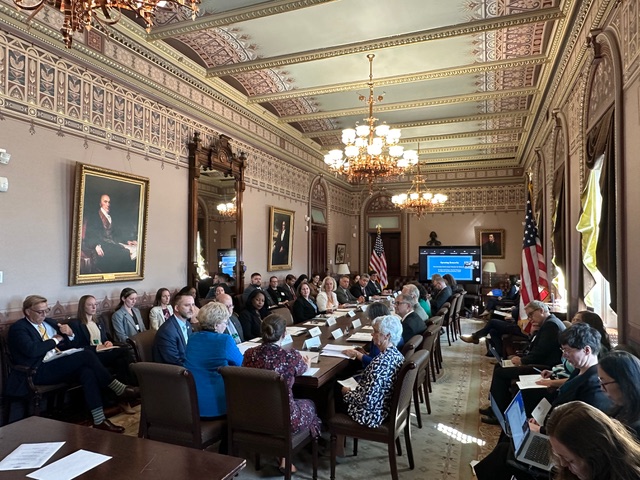Last month, the Ocean Research Advisory Panel (ORAP) sent a pivotal report to the U.S. Ocean Policy Committee (OPC) titled "Toward a National Ocean Data Strategy." The report contains 17 key recommendations centered on three core goals: improving federal ocean data management, fostering and incentivizing partnerships, and enhancing public access and usability of ocean data. ORAP's overarching vision is to support the creation of a National Ocean Data Strategy, underpinned by a robust Implementation Plan to ensure measurable impacts.
In a significant meeting at the Eisenhower Executive Office Building in the White House complex, MTS CEO and ORAP co-chair Chris Ostrander, along with co-chair Mary Glackin, had the privilege of presenting the report to OPC members, delivering remarks, and responding to questions. The report was well-received, sparking a productive dialogue on the future of ocean data strategy in the United States.

For those unfamiliar, the OPC is a cabinet-level interagency group within the Executive Office of the President. It plays a critical role in coordinating federal activities related to ocean and coastal waters, informing national ocean policy, and identifying key ocean science and technology needs. Additionally, the OPC seeks to leverage federal resources to maximize the impact of investments in ocean research. Notably, several MTS members contribute to ORAP, with some also serving on the OPC, providing a valuable MTS presence in both advisory and policy-setting roles.
ORAP's primary function is to offer independent recommendations to the OPC on various ocean policy issues. These responsibilities include advising on policies for the National Oceanographic Partnership Program, assessing national oceanographic science and engineering needs, advancing diversity and inclusion in ocean sciences, setting national ocean research priorities, and other tasks as needed. This advisory work directly aligns with MTS's mission, as many MTS members are deeply engaged in generating and using ocean data—whether through sensor and platform development, observing systems operations, or the creation of data-driven products and services for decision-making.
The ORAP report emphasizes the potential for a cohesive, federal-level data strategy to unlock vast research and business opportunities within the ocean technology sector. It underscores the limitations of the current federal data systems, which have developed in a stepwise fashion to meet increasing needs for ocean data collection, management, and distribution over the past few decades. Given the unprecedented advances in computing, machine learning, and the growing emphasis on inclusive ocean science, ORAP sees this as a crucial moment to implement a comprehensive and forward-looking approach to ocean data management. Such a strategy could catalyze a new era of ocean data applications, fostering public-private partnerships and bolstering collaborative research and innovation across the sector.
Looking ahead, ORAP is working on its next report/recommendations, which will focus on public-private partnerships to advance emerging marine technologies. As MTS members continue to drive ocean science and technology, we eagerly anticipate further developments and new opportunities that may arise from these national efforts.
The Marine Technology Society will keep members updated on ORAP's progress and the OPC's responses to the recommendations, highlighting areas where MTS members can engage and contribute to these transformative initiatives.

